
Miami Herald Haiti and Caribbean correspondent Jacqueline Charles discusses new revelations about the assassination of Haitian President Jovenel Moïse. In her piece, “Grenade-dropping drones, a paranoid president, guards who ran: Latest on Haiti assassination,” she reports the night President Jovenel Moïse was shot “was actually the second time in a span of weeks that his life was in danger, according to testimony from one of the Colombians in custody, and one of the Haitian Americans.”
Transcript
AMY GOODMAN: I want to ask Jacqueline Charles about the latest news on the assassination of the Haitian president, Jovenel Moïse. Your recent Miami Herald article is headlined “Grenade-dropping drones, a paranoid president, guards who ran: Latest on Haiti assassination.” In it, you write, “The night Moïse was shot was actually the second time in a span of weeks that his life was in danger, according to testimony from one of the Colombians in custody, and one of the Haitian Americans,” as well. “Two weeks earlier, a plan to arrest Moïse, using a bogus arrest warrant, upon his return from a trip to Turkey was thwarted when a signal to act was never given.” That’s according to Jheyner Alberto Carmona Florez, an ex-Colombian solider now in custody. He told this to police. “Another plan to employ disgruntled, masked Haitian police officers known as Fantôm 509 to grab the president was also aborted, according to” people involved. And you write, according to this report — what is Fantôm 509? Who is Joseph Felix Badio? And what role may he have played in the assassination of President Moïse? Is there a warrant for his arrest?
JACQUELINE CHARLES: So, Fantôm 509 is a disgruntled part inside the police. Some of them are active; some of them are former. A number of them have been arrested recently. But earlier this year, some of your viewers may recall, we saw the police in Haiti protesting, taking on the streets, blowing up cars, letting out prisoners. And what you have inside the police is this low morale, people just feeling that they’re working as police officers, they cannot survive. And we’ve been watching this implosion of a police force in Haiti that the United States government actually supports financially, the U.N. has trained and has rebuilt, but we have seen it just crumble in front of us.
And one of the things that I found in my investigation, when I was looking at these reports and talking to people, is that it appears that that low morale, that disgruntledness inside the Haitian National Police found its way also into the presidential security apparatus. According to his wife, there should have been 30 to 50 police officers assigned to President Jovenel Moïse. But on the night in question, the 7th of July, there were seven police officers that were assigned, one of whom disappeared at 4 p.m. and did not come back until after the assassination, this according to testimony. This particular gentleman is actually a leader, a team leader. So you had six officers that were there on the ground.
And what was interesting is that all of these officers who were interviewed, whether they have been taken into custody for lack of action or for alleged involvement or they have not been arrested but they gave — they provided additional information, they told police investigators that under no circumstances that they were allowed in President Jovenel Moïse’s house. So, could you imagine, you are part of the protection of a president — think Secret Service in the United States and that they are not allowed in the private residence of President Biden. This is what was happening here. So, on the night in question, none of these guys and girls attempted to go inside the president’s house, where there was an evacuation plan. There was a back door.
So, for 30 to 45 minutes, President Jovenel Moïse is hearing drones dropping grenades. He’s hearing automatic gunfire. He’s calling the phone frantically, “Come! Come save me! My life is in danger! Send reinforcements!” Nobody showed up. By the time, you know, a high-ranking officer actually came, the president was dead. His wife was seriously injured. And these soldiers, who insisted they were not there to kill the president, they had nothing to do with it — they were there to arrest him and to help to install the new president, is the story that they’re telling, along with two Haitian Americans who said they were translators. But, you know, there was a sort of firefight that was going on.
Badio is a former government functionary. He’s been in the Ministry of Immigration. He was a consultant until May, when he was fired for, quote-unquote, “ethical breaches.” He worked in the ministry of the anti-corruption government unit. This is a guy who’s well known in Haiti’s political circles — I mean, in terms of people in power. President Moïse knew him. I heard that he, at one point, Badio, was even on a shortlist for a job, a job in the government, in Moïse’s administration. So, he is described by police in this report as, quote-unquote, “one of the brains” of this operation. He has told people that he —
JUAN GONZÁLEZ: Well, Jacqueline — Jacqueline, if I could interrupt?
JACQUELINE CHARLES: Yes.
JUAN GONZÁLEZ: We only have about a minute left, but I just wanted to ask you — in terms of the leaked report, there have been over 40 people taken into custody, but no indication in this report of who actually was the mastermind of this assassination.
JACQUELINE CHARLES: Exactly. Exactly. So, police just tell you, you know — they’re still saying that it was Sanon, who is a Haitian American doctor and pastor, that he’s one of the masterminds, or Badio is one of the brains. But the report still does not tell us, you know, who financed this. What we have found at the Miami Herald in our independent investigation is the people in custody did not have the means, the financial means, to finance this. And so, this is the job of the investigative judge who now has the case. He has to continue to probe and ask the question, whether or not with the assistance of the FBI, HSI from the U.S. — whether or not we will be able to find out who truly financed this very expensive and expansive operation to kill a president —
AMY GOODMAN: But, Jacqueline —
JACQUELINE CHARLES: — and who fired the shot.
AMY GOODMAN: — now the prosecutor was going to charge the prime minister, Ariel Henry, and so he fired the prosecutor and the justice minister.
JACQUELINE CHARLES: No, no, no, no. The prosecutor was fired when he did this. And under legal experts in Haiti, the prosecutor was out of his jurisdiction. Once a case has gone to an investigative judge, a prosecutor cannot mount a parallel investigation. And I think what we saw, this was an example in terms of how this case is starting to become politicized. You have judges who are in hiding, who have fled, clerks who have fled, who were part of the initial investigation. And this is the concern in terms of whether or not they will allow this process to work the way it’s supposed to work, in a country that already has issues with its judiciary.
So, the prosecutor, based on the letter that we got from the Prime Minister’s Office — and when it was dated, he was already fired when he did this. But legal experts said, even if he was not fired, he had no legal jurisdiction to try to mount a separate investigation against the prime minister based on the fact that police said there were two phone calls from Badio more than three hours after the president was killed. And Badio was in conversations with a number of other politicians. There’s one call that we saw on there where he was in constant communication with somebody over 200 times. He was even in conversations with his girlfriend the night of, and his apartment is right there in the same neighborhood as the president. But we haven’t heard anything about these other individuals. But what you did hear about is a fired prosecutor trying to go after the current prime minister on this.
AMY GOODMAN: Well, there is so much to unpack here. We can’t do it now, but we thank you so much, Jacqueline Charles, Miami Herald's Haiti and Caribbean correspondent, speaking to us from Del Rio, Texas, and Guerline Jozef, executive director of the Haitian Bridge Alliance, also in Del Rio, where up to 15,000 Haitians are. Hundreds have been deported to Haiti, and it's expected more will be.
Coming up, we go to Texas, or we stay there, to speak with an abortion provider about Texas’ near-total ban on abortions. Back in 30 seconds.

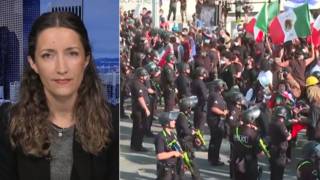
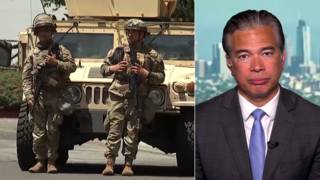
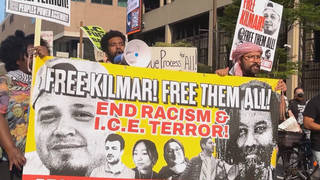
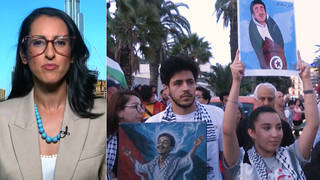
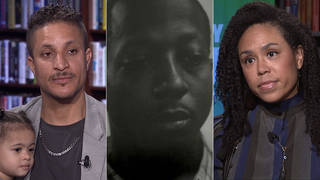


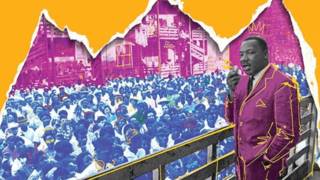



Media Options